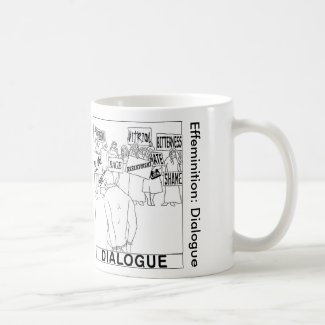The suggestion is so subtle, so easy to miss... that distrust and dislike are bigotry, but only when directed at women... that it is perhaps natural and acceptable to distrust and dislike men.
There are deeper examples as well, such as the act of redefining rape so that it only refers to penetration of a woman by a man. The definition excludes victims who are not women, and victims who are raped by women, thereby marking the violation of those victims as a lesser crime. Of similar depth and importance is the use of labels in the application of double standards, such as referring to women lashing out in response to emotional-only intimidation as an act of self-defense, while labeling men under the same circumstances as aggressive. This is seen in the social tolerance of women slapping in response to offense at verbal communication or in anger at non-aggressive behavior, while men who do this are condemned and penalized. The female aggression response is considered justified, while the male aggression response is considered abuse.
To my mind, this is an incredibly subversive and dishonest tactic, based in the inability to face, evaluate, and address social issues from an altruistic standpoint. When the goal is not equality in treatment of human rights, but instead, privilege and power, advocacy cannot be approached with candor. No one would follow a movement with "Give us the upper hand just because we want it!" as a battle cry.
This line of thinking moved right into my habit of analogous and pictorial consideration. It's a frequent thing for me to use comparisons, hypothesis, and imagery to cement an understanding on any given topic. This time, doing so led to the creation of political cartoons to highlight my observation of the phenomenon of deliberate term feminization and the effort in which it is done. The title, Effeminitions, suggested by my friend and fellow redditor, Mitschu, after I described to him the concept, is in reference to that phenomenon. Below are the first 3 in the planned series.




